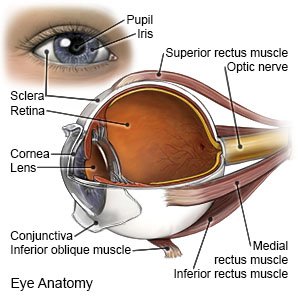Eyelid Swelling
Medically reviewed by Drugs.com. Last updated on Apr 6, 2025.
AMBULATORY CARE:
Eyelid swelling
can occur in 1 or both eyes. The upper eyelid, lower eyelid, or both can become swollen. This depends on the cause.
 |
Signs and symptoms
depend on the cause of the swelling. Your eyelid may be red, itchy, painful, or warm to the touch. You may have a rash or blisters on your eyelid.
Seek care immediately if:
- You have a sudden change in vision or vision loss.
- You have pain when you move your eye.
Call your doctor if:
- Your symptoms do not get better even after treatment.
- You have questions or concerns about your condition or care.
Treatment
depends on the cause of the swelling. You may need any of the following:
- Medicines can help decrease pain, swelling, or itching. You may need medicine to treat an infection.
- Surgery may be needed to remove a mass, cyst, or foreign body if other treatments do not work.
Manage your symptoms:
- Apply a warm compress to your eyelid as directed. Use a soft washcloth soaked in warm water. Leave the compress on your eyelid for 5 to 10 minutes. Do this up to 5 times a day, or as directed.
- Wash your hands before and after touching your eye area. Use soap and water. Do not allow medicine containers to touch your eye when you are applying medicine to the area. Examples include eye drops or ointments.

- Care for your eye area as directed. Carefully wash the eyelid with a gentle soap and water. Your provider may recommend using baby soap to clean the area.
Follow up with your doctor as directed:
Write down your questions so you remember to ask them during your visits.
© Copyright Merative 2025 Information is for End User's use only and may not be sold, redistributed or otherwise used for commercial purposes.
The above information is an educational aid only. It is not intended as medical advice for individual conditions or treatments. Talk to your doctor, nurse or pharmacist before following any medical regimen to see if it is safe and effective for you.
Further information
Always consult your healthcare provider to ensure the information displayed on this page applies to your personal circumstances.
